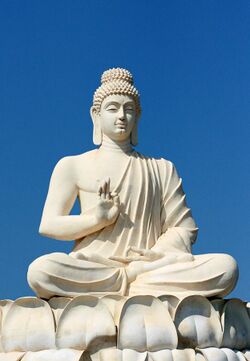Buddha (title)
Topic: Religion
 From HandWiki - Reading time: 3 min
From HandWiki - Reading time: 3 min

In Buddhism, Buddha (/ˈbuːdə, ˈbʊdə/; Sanskrit: बुद्ध), "awakened one,"[2] is a title for someone who is awake, and has attained nirvana and Buddhahood. The title is most commonly used for Gautama Buddha, the founder of Buddhism, who is often simply known as "the Buddha". However, the title can also be used for others who have achieved enlightenment, such as the other human Buddhas who achieved enlightenment before Gautama, the five celestial Buddhas worshipped primarily by Vajrayana followers, and the bodhisattva named Maitreya, who will achieve enlightenment in the future and succeed Gautama Buddha as the supreme Buddha of the world.
Etymology
The word Buddha means "the awakened one" or "the enlightened one". According to the Chinese Buddhist tradition, the title is literally translated as "the knowing one".[3] "Buddha" is also used as a title for the first awakened being in a Yuga era. In most Buddhist traditions, Siddhartha Gautama is regarded as the supreme Buddha (Pali sammāsambuddha, Sanskrit samyaksaṃbuddha) of the present age.
Hypothetical root budh "perceive" 1. Pali buddha – "understood, enlightened", masculine "the Buddha"; Aśokan (the language of the Inscriptions of Aśoka) Budhe nominative singular; Prakrit buddha – ‘ known, awakened ’; Waigalī būdāī, "truth"; Bashkarīk budh "he heard"; Shina Gilgitī dialect budo, "awake"; Kashmiri bọ̆du, "quick of understanding (especially of a child)"; Sinhalese buj (j written for d), budu, bud, but, "the Buddha".[4] The term is mirrored in various Indo-European languages with a common root/stem: *bheud- and meanings: to be awakened.
Buddhavamsa named 25 Buddhas including Gautama in section three until twenty seven, while the twenty eight section lists three Buddhas who lived before the time of Dipankara Buddha.[5]
List of the named Buddhas

The seven most recent Buddhas to attain enlightenment are the following:[1]
- Vipassī Buddha
- Sikhī Buddha
- Vessabhū Buddha
- Kakusandha Buddha
- Koṇāgamana Buddha
- Kassapa Buddha
- Gautama Buddha
See also
References
- ↑ 1.0 1.1 John Marshall (1918), A Guide to Sanchi, pp. 46ff (Public Domain text)
- ↑ Buswell 2004, p. 71.
- ↑ Fayun, 翻譯名義集,Song dynasty
- ↑ Turner, Sir Ralph Lilley. "buddha 9276; 1962–1985". A comparative dictionary of the Indo-Aryan languages. Oxford University Press. p. 525. http://dsal.uchicago.edu/cgi-bin/philologic/contextualize.pl?p.2.soas.1976481. Retrieved 22 February 2010.
- ↑ "History of the Buddhas". Buddha Dharma Education Association. http://www.buddhanet.net/budvamsa.htm. Retrieved 8 December 2015.
Sources
- Buswell, Robert, ed. (2004), Encyclopedia of Buddhism, MacMIllan reference USA
 KSF
KSF